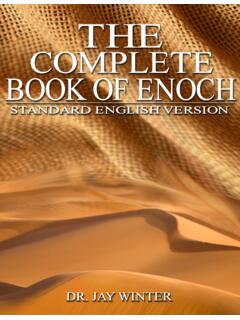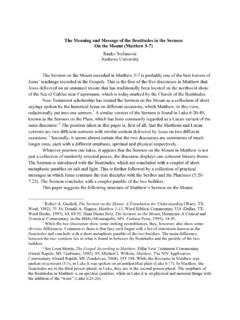Transcription of The Richest Man In Babylon - The Diamond's Mine
1 1 Brought To You By A Classic From The Diamond s Mine Library The Richest Man In Babylon 1926 George S. Clason 2 Brought To You By The Richest Man In Babylon 1926 Public Domain Notice This classic writing compliments of The Diamond s Mine Online Library. It is public domain and may be distributed freely. 3 Brought To You By Index About The 6 Foreword .. 7 An Historical Sketch of Babylon .. 8 The Man Who Desired The Richest Man In Seven Cures For a Lean Purse ..30 The First Cure ..34 Start thy purse to 34 The Second Cure ..37 Control thy 37 The Third Cure ..39 Make thy gold multiply.. 39 The Fourth Guard thy treasures from loss.. 41 The Fifth Cure.
2 43 Make of thy dwelling a profitable investment.. 43 The Sixth Insure a future 45 The Seventh Cure ..47 Increase thy ability to earn.. 47 4 Brought To You By Meet the Goddess of Good The Five Laws of THE FIVE LAWS OF GOLD .. 66 The First Law of 70 The Second Law of Gold .. 70 The Third Law of 70 The Fourth Law of 71 The Fifth Law of Gold .. 71 The Gold Lender of Babylon ..73 The Walls of Babylon ..84 The Camel Trader of The Clay Tablets From Babylon ..98 Tablet No. I .. 99 Tablet No. 100 Tablet No. 101 Tablet No. 101 Tablet No. V .. 103 The Luckiest Man In 107 5 Brought To You By Ahead of you stretches your future like a road leading into the distance.
3 Along that road are ambitions you wish to you wish to gratify. To bring your ambitions and desires to fulfillment, you must be successful with money. Use the financial principles made clear in the pages which follow. Let them guide you away from the stringencies of a lean purse to that fuller, happier life a full purse makes possible. Like the law of gravity, they are universal and unchanging. May they prove for you, as they have proven to so many others, a sure key to a fat purse, larger bank balances and gratifying financial progress. LO, MONEY IS PLENTIFUL FOR THOSE WHO UNDERSTAND THE SIMPLE RULES OF ITS ACQUISITION 1. Start thy purse to fattening 2. Control thy expenditures 3.
4 Make thy gold multiply 4. Guard thy treasures from loss 5. Make of thy dwelling a profitable investment 6. Insure a future income 7. Increase thy ability to earn 6 Brought To You By About The Author GEORGE SAMUEL CLASON was born in Louisiana, Missouri, on November 7, 1874. He attended the University of Nebraska and served in the United States Army during the Spanish-American War. Beginning a long career in publishing, he founded the Clason Map Company of Denver, Colorado, and published the first road atlas of the United States and Canada. In 1926, he issued the first of a famous series of pamphlets on thrift and financial success, using parables set in ancient Babylon to make each of his points.
5 These were distributed in large quantities by banks and insurance companies and became familiar to millions, the most famous being "The Richest Man in Babylon ," the parable from which the present volume takes its title. These "Babylonian parables " have become a modern inspirational classic. 7 Brought To You By Foreword Our prosperity as a nation depends upon the personal financial prosperity of each of us as individuals. This book deals with the personal successes of each of us. Success means accomplishments as the result of our own efforts and abilities. Proper preparation is the key to our success. Our acts can be no wiser than our thoughts. Our thinking can be no wiser than our understanding.
6 This book of cures for lean purses has been termed a guide to financial understanding. That, indeed, is its purpose: to offer those who are ambitious for financial success an insight which will aid them to acquire money, to keep money and to make their surpluses earn more money. In the pages which follow, we are taken back to Babylon , the cradle in which was nurtured the basic principles of finance now recognized and used the world over. To new readers the author is happy to extend the wish that its pages may contain for them the same inspiration for growing bank accounts, greater financial successes and the solution of difficult personal financial problems so enthusiastically reported by readers from coast to coast.
7 To the business executives who have distributed these tales in such generous quantities to friends, relatives, employees and associates, the author takes this opportunity to express his gratitude. No endorsement could be higher than that of practical men who appreciate its teachings because they, themselves, have worked up to important successes by applying the very principles it advocates. Babylon became the wealthiest city of the ancient world because its citizens were the Richest people of their time. They appreciated the value of money. They practiced sound financial principles in acquiring money, keeping money and making their money earn more money. They provided for themselves what we all for the future.
8 G. S. C. 8 Brought To You By An Historical Sketch of Babylon In the pages of history there lives no city more glamorous than Babylon . Its very name conjures visions of wealth and splendor. Its treasures of gold and jewels were fabulous. One naturally pictures such a wealthy city as located in a suitable setting of tropical luxury, surrounded by rich natural resources of forests, and mines. Such was not the case. It was located beside the Euphrates River, in a flat, arid valley. It had no forests, no mines not even stone for building. It was not even located upon a natural trade-route. The rainfall was insufficient to raise crops. Babylon is an outstanding example of man's ability to achieve great objectives, using whatever means are at his disposal.
9 All of the resources supporting this large city were man-developed. All of its riches were man-made. Babylon possessed just two natural resources a fertile soil and water in the river. With one of the greatest engineering accomplishments of this or any other day, Babylonian engineers diverted the waters from the river by means of dams and immense irrigation canals. Far out across that arid valley went these canals to pour the life giving waters over the fertile soil. This ranks among the first engineering feats known to history. Such abundant crops as were the reward of this irrigation system the world had never seen before. Fortunately, during its long existence, Babylon was ruled by successive lines of kings to whom conquest and plunder were but incidental.
10 While it engaged in many wars, most of these were local or defensive against ambitious conquerors from other countries who coveted the fabulous treasures of Babylon . The outstanding rulers of Babylon live in history because of their wisdom, enterprise and justice. Babylon produced no strutting monarchs who sought to conquer the known world that all nations might pay homage to their egotism. As a city, Babylon exists no more. When those energizing human forces that built and maintained the city for thousands of years were withdrawn, it soon became a deserted ruin. The site of the city is in Asia about six hundred miles east of the Suez Canal, just north of the Persian Gulf.






